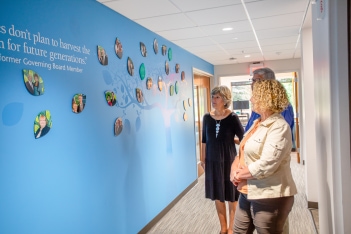Recruiting and retaining skilled employees is never easy, regardless of industry, position or time in history. COVID, however, introduced a unique set of challenges for those who assist with hiring new staff. At the onset of the pandemic, companies focused on how to continue business while maintaining employees’ physical and mental health. Large shifts to remote or “hybrid” work environments and amended PTO policies were just a few effects that COVID had on the workforce. In addition, people reevaluated what was important to them and their work/life balance, among other priorities. At a time with so much uncertainty and change, recruiting, developing and retaining staff has become more challenging than ever.
As a result, many human resource and hiring managers have had to pivot in response to the pandemic and its lingering effects on the workplace. Here are a few tips to help your organization as you navigate the new environment of onboarding and retaining staff.
1) When it comes to retention, be sure you regularly connect with staff and ensure their needs are being met. Without appropriate training and development, compensation and a healthy company culture, you always will be recruiting. It’s important to remember that promoting from within is often your best choice. When you set your team up for success and growth, a culture of promoting from within will follow.
2) Recruiters and human resources staff need to be ready when it’s time to post jobs and hire externally. Connect with hiring managers to clearly define the role they need to fill. This should be done the moment you find out there is a need. Once you confirm the job description and duties, you should make time to post jobs at varied job boards and sources, including those that attract diverse candidates.
3) Know when to keep it simple. While job duties shift and change, reevaluate the minimum requirements on the role’s job description. Those skill and experience requirements may be outdated and could limit your applicant pool. Determine which requirements have flexibility with your hiring team.
4) Audit the existing interview process to determine if each step is needed. Simplicity also applies to the interview process. There are likely several things that can be shortened or eliminated altogether. For example, do you really need three to five references? Or do one or two references with well-prepared questions provide you enough information? I’ve also found that one preliminary phone screen and one in-person interview with stakeholders should provide you with the needed insights. There always will be a balance between doing your due diligence and not elongating processes in ways that will lose you candidates. You will need to determine what will work best for you and your team.
5) Once you’ve selected candidates with relevant experience, stay in contact with them and provide a level of communication that demonstrates your company’s interest. In this job market, things move quickly and quietly. If you’re not making efforts to connect with your candidates in a timely manner, they will not feel valued. Staying in touch will help you know when candidates have offers and interviews with other organizations. Experiencing a personal and meaningful interaction with your company makes a lasting impression. When people know you care, they’re more likely to care themselves!
6) Encourage equitable practices. Keep the process and the interview questions the same for each candidate. Yes, there will be follow-up questions that are different based on each person’s experience. Using the same questions, interviewers and process to evaluate each applicant will help eliminate potential biases and ensure each candidate’s experiences are equitable.
Shifts in the labor market always will present new challenges. Organizations need to be nimble and proactive. We’ve learned in the last three years that there’s no status quo. If you keep in touch with employees and candidates, and stay well-informed on the changing landscape, you will be better equipped to serve both your staff and your company’s mission.








